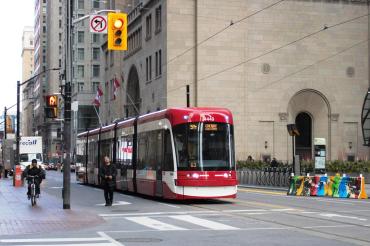U of T researchers find big improvements to TTC commutes on King Street pilot route

Published: December 5, 2017
U of T researchers have crunched the numbers from the King Street pilot project’s first two weeks in operation and found big improvements to travel times for TTC commuters along the city’s busiest streetcar routes.
The pilot, which began on November 12, aims to reduce car traffic by only allowing motorists to drive one block on a 2.6 kilometre stretch of King Street before forcing them to turn right, giving priority to streetcars, which transport over 65,000 passengers per day.
Read the CP24 article
“The main result is that travel times have been improved by about four to five minutes during the rush hour period and that’s for trips that start on one side of the pilot project and continue through to the end of the pilot project,” Steven Farber, an assistant professor in the department of human geography at U of T Scarborough told CP24.
Farber is also the co-director of U of T’s Spatial Analysis of Urban Systems lab, which conducted the research on the King Street pilot.
Farber and researchers from the lab analyzed TTC GPS data from before and after the pilot was implemented. Among their findings: Before the pilot, 19 per cent of trips during the evening peak (4-7 pm) took longer than 25 minutes, compared to just 1.3 per cent after the pilot launched.
“From a transit perspective, and an operational perspective, the pilot is achieving, I think, the goal of providing a much faster and reliable transit route to tens of thousands of people daily,” Farber told the Toronto Star.



